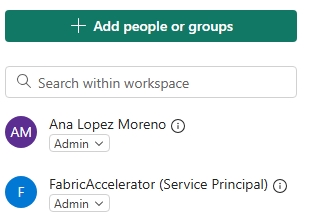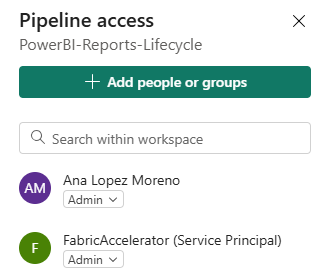We use cookies on this site to enhance your user experience
By clicking the Accept button, you agree to us doing so. More info on our cookie policy
We use cookies on this site to enhance your user experience
By clicking the Accept button, you agree to us doing so. More info on our cookie policy
GitHub Actions Automation
Option 1: Azure CLI
az ad sp create-for-rbac --name "fabric-cicd-sp" --role contributor --scopes /subscriptions/{subscription-id}
Option 2: Azure Portal
fabric-cicd-spConfigure API Permissions:
Microsoft Graph.Group.Read.AllMicrosoft Graph.User.ReadCreate Client Secret:
Save These Values:
Tenant ID: [from Azure AD Overview]
Client ID: [from App registration Overview]
Client Secret: [the secret value]
For Each Workspace (DEV, UAT, PROD):
fabric-cicd-sp

Figure: Workspace Access Management
fabric-cicd-sp

Figure: Pipeline Access Management
Go to Settings → Secrets and variables → Actions:
# Azure/Fabric Authentication
FABRIC_TENANT_ID=your-azure-tenant-id
FABRIC_CLIENT_ID=your-service-principal-client-id
FABRIC_CLIENT_SECRET=your-service-principal-client-secret
# Fabric Configuration
FABRIC_PIPELINE_NAME=PowerBI-Reports-Lifecycle
# Optional: Workspace IDs
DEV_WORKSPACE_ID=your-dev-workspace-id
UAT_WORKSPACE_ID=your-uat-workspace-id
PROD_WORKSPACE_ID=your-prod-workspace-id
Create Environments:
Settings → EnvironmentsUAT Environment Configuration:
Required reviewers: ✅ Add reviewers
Prevent self-review: ✅ Optional
Wait timer: 0 minutes (optional)
Deployment branches: main branch only
PROD Environment Configuration:
Required reviewers: ✅ Senior reviewers required
Prevent self-review: ✅ Enabled
Wait timer: 5-10 minutes (cooling period)
Deployment branches: main branch only
Create the deployment script that the GitHub Actions workflow calls.
scripts/deploy_all.pyThis Python script uses the Microsoft Fabric REST API to trigger deployment pipeline operations:
#!/usr/bin/env python3
"""
Microsoft Fabric Deployment Pipeline Script
Automates deployment between pipeline stages using Fabric REST API
"""
import os
import sys
import time
import json
import requests
from typing import Optional, Dict, Any
class FabricDeployment:
def __init__(self, tenant_id: str, app_id: str, client_secret: str):
self.tenant_id = tenant_id
self.app_id = app_id
self.client_secret = client_secret
self.access_token = None
self.base_url = "https://api.fabric.microsoft.com/v1"
def get_access_token(self) -> bool:
"""
Get OAuth2 access token using client credentials flow for Fabric API
"""
token_url = f"https://login.microsoftonline.com/{self.tenant_id}/oauth2/v2.0/token"
token_data = {
'grant_type': 'client_credentials',
'client_id': self.app_id,
'client_secret': self.client_secret,
'scope': 'https://api.fabric.microsoft.com/.default'
}
try:
response = requests.post(token_url, data=token_data)
response.raise_for_status()
token_response = response.json()
self.access_token = token_response.get('access_token')
if self.access_token:
print("✅ Successfully authenticated with Microsoft Fabric service")
return True
else:
print("❌ Failed to obtain access token")
return False
except requests.exceptions.RequestException as e:
print(f"❌ Error during authentication: {e}")
return False
def get_headers(self) -> Dict[str, str]:
"""
Get HTTP headers with authorization token
"""
return {
'Authorization': f'Bearer {self.access_token}',
'Content-Type': 'application/json'
}
def get_deployment_pipelines(self) -> Optional[list]:
"""
Get all deployment pipelines using Fabric API
"""
url = f"{self.base_url}/deploymentPipelines"
try:
response = requests.get(url, headers=self.get_headers())
response.raise_for_status()
pipelines_data = response.json()
return pipelines_data.get('value', [])
except requests.exceptions.RequestException as e:
print(f"❌ Error fetching deployment pipelines: {e}")
return None
def get_pipeline_stages(self, pipeline_id: str) -> Optional[list]:
"""
Get deployment pipeline stages using Fabric API
"""
url = f"{self.base_url}/deploymentPipelines/{pipeline_id}/stages"
try:
response = requests.get(url, headers=self.get_headers())
response.raise_for_status()
stages_data = response.json()
return stages_data.get('value', [])
except requests.exceptions.RequestException as e:
print(f"❌ Error fetching pipeline stages: {e}")
return None
def find_pipeline_by_name(self, pipeline_name: str) -> Optional[Dict[str, Any]]:
"""
Find a deployment pipeline by its display name
"""
pipelines = self.get_deployment_pipelines()
if pipelines is None:
return None
for pipeline in pipelines:
if pipeline.get('displayName') == pipeline_name:
print(f"✅ Found pipeline: {pipeline_name}")
return pipeline
print(f"❌ Pipeline '{pipeline_name}' not found")
return None
def deploy_stage_content(self, pipeline_id: str, source_stage_order: int) -> bool:
"""
Deploy content from source stage to target stage using Fabric API
"""
# Get pipeline stages to determine source and target stage IDs
stages = self.get_pipeline_stages(pipeline_id)
if not stages:
print("❌ Failed to retrieve pipeline stages")
return False
# Sort stages by order to find source and target
sorted_stages = sorted(stages, key=lambda x: x.get('order', 0))
if source_stage_order >= len(sorted_stages) - 1:
print(f"❌ Invalid source stage order: {source_stage_order}. Cannot deploy from the last stage.")
return False
source_stage = sorted_stages[source_stage_order]
target_stage = sorted_stages[source_stage_order + 1]
source_stage_id = source_stage.get('id')
target_stage_id = target_stage.get('id')
print(f"🚀 Deploying from '{source_stage.get('displayName')}' to '{target_stage.get('displayName')}'")
url = f"{self.base_url}/deploymentPipelines/{pipeline_id}/deploy"
deploy_body = {
"sourceStageId": source_stage_id,
"targetStageId": target_stage_id,
"note": f"Automated deployment from GitHub Actions - Stage {source_stage_order}",
"options": {
"allowCreateArtifact": True,
"allowOverwriteArtifact": True
}
}
try:
response = requests.post(
url,
headers=self.get_headers(),
json=deploy_body
)
response.raise_for_status()
if response.status_code == 202:
# Long running operation
operation_location = response.headers.get('Location')
if operation_location:
operation_id = operation_location.split('/')[-1]
print(f"📋 Operation ID: {operation_id}")
return self.wait_for_operation(pipeline_id, operation_id)
else:
print("⚠️ Deployment started but no operation ID found")
return True
else:
deploy_result = response.json()
print(f"✅ Deployment completed: {deploy_result}")
return True
except requests.exceptions.RequestException as e:
print(f"❌ Error during deployment: {e}")
if hasattr(e, 'response') and e.response is not None:
try:
error_detail = e.response.json()
print(f"📄 Error details: {json.dumps(error_detail, indent=2)}")
except:
print(f"📄 Error response: {e.response.text}")
return False
def wait_for_operation(self, pipeline_id: str, operation_id: str) -> bool:
"""
Wait for the deployment operation to complete using Fabric API
"""
url = f"{self.base_url}/operations/{operation_id}"
max_attempts = 240 # Maximum 20 minutes (240 * 5 seconds)
attempts = 0
while attempts < max_attempts:
try:
response = requests.get(url, headers=self.get_headers())
response.raise_for_status()
operation = response.json()
status = operation.get('status', 'Unknown')
print(f"📊 Operation Status: {status} (Attempt {attempts + 1}/{max_attempts})")
if status in ['NotStarted', 'Executing', 'Running']:
print("⏳ Waiting for operation to complete...")
time.sleep(5)
attempts += 1
continue
elif status in ['Succeeded', 'Completed']:
print("✅ Deployment completed successfully!")
return True
else:
print(f"❌ Deployment failed with status: {status}")
if 'error' in operation:
print(f"📄 Error details: {json.dumps(operation['error'], indent=2)}")
return False
except requests.exceptions.RequestException as e:
print(f"❌ Error checking operation status: {e}")
return False
print("⏰ Operation timed out after 20 minutes")
return False
def main():
"""
Main function to execute the deployment
"""
# Get parameters from environment variables or command line arguments
tenant_id = os.getenv('TENANT_ID')
app_id = os.getenv('APP_ID')
client_secret = os.getenv('CLIENT_SECRET')
pipeline_name = os.getenv('PIPELINE_NAME')
stage_order = int(os.getenv('STAGE_ORDER', '0'))
# If not in environment variables, try command line arguments
if not all([tenant_id, app_id, client_secret, pipeline_name]):
if len(sys.argv) >= 5:
tenant_id = sys.argv[1]
app_id = sys.argv[2]
client_secret = sys.argv[3]
pipeline_name = sys.argv[4]
stage_order = int(sys.argv[5]) if len(sys.argv) > 5 else 0
else:
print("❌ Error: Missing required parameters")
print("Usage: python deploy_all.py [tenant_id] [app_id] [client_secret] [pipeline_name] [stage_order]")
print("Or set environment variables: TENANT_ID, APP_ID, CLIENT_SECRET, PIPELINE_NAME, STAGE_ORDER")
sys.exit(1)
# Validate pipeline name is provided
if not pipeline_name:
print("❌ Error: Pipeline name is required")
print("Set PIPELINE_NAME environment variable or provide as command line argument")
sys.exit(1)
# Display deployment configuration
print("🚀 Starting Microsoft Fabric Deployment")
print(f"📋 Pipeline: {pipeline_name}")
print(f"📊 Source Stage Order: {stage_order}")
print(f"🔐 Tenant ID: {tenant_id[:8]}...")
print("-" * 50)
# Initialize Fabric deployment client
deployment = FabricDeployment(tenant_id, app_id, client_secret)
# Authenticate
if not deployment.get_access_token():
print("❌ Authentication failed")
sys.exit(1)
# Find the pipeline
pipeline = deployment.find_pipeline_by_name(pipeline_name)
if not pipeline:
print(f"❌ Pipeline with name '{pipeline_name}' was not found")
# List available pipelines for debugging
print("📋 Available pipelines:")
pipelines = deployment.get_deployment_pipelines()
if pipelines:
for p in pipelines:
print(f" - {p.get('displayName', 'Unknown')}")
sys.exit(1)
pipeline_id = pipeline.get('id')
print(f"✅ Found pipeline with ID: {pipeline_id}")
# Execute deployment
success = deployment.deploy_stage_content(pipeline_id, stage_order)
if success:
print("🎉 Deployment completed successfully!")
sys.exit(0)
else:
print("💥 Deployment failed!")
sys.exit(1)
if __name__ == "__main__":
main()
Key Capabilities:
Usage Options:
Option 1: Environment Variables (Recommended for CI/CD)
export TENANT_ID="your-tenant-id"
export APP_ID="your-app-id"
export CLIENT_SECRET="your-client-secret"
export PIPELINE_NAME="PowerBI-Reports-Lifecycle"
export STAGE_ORDER=0
python scripts/deploy_all.py
Option 2: Command Line Arguments (For Testing)
python scripts/deploy_all.py \
"tenant-id" \
"app-id" \
"client-secret" \
"PowerBI-Reports-Lifecycle" \
0
Stage Order Mapping:
0: Deploy from DEV (stage 0) to UAT (stage 1)1: Deploy from UAT (stage 1) to PROD (stage 2)Create .github/workflows/fabric-deployment.yml:
name: Power BI CI/CD Pipeline
on:
push:
branches: [main]
paths: ['fabric/**']
workflow_dispatch:
jobs:
deploy-uat:
name: Deploy to UAT
runs-on: ubuntu-latest
environment: UAT
steps:
- name: Checkout repository
uses: actions/checkout@v4
- name: Setup Python
uses: actions/setup-python@v4
with:
python-version: '3.11'
- name: Install dependencies
run: pip install requests python-dotenv
- name: Deploy to UAT
run: python ./scripts/deploy_all.py
env:
TENANT_ID: $
APP_ID: $
CLIENT_SECRET: $
PIPELINE_NAME: $
STAGE_ORDER: 0 # DEV (0) to UAT (1)
deploy-prod:
name: Deploy to Production
runs-on: ubuntu-latest
environment: PROD
needs: deploy-uat
steps:
- name: Checkout repository
uses: actions/checkout@v4
- name: Setup Python
uses: actions/setup-python@v4
with:
python-version: '3.11'
- name: Install dependencies
run: pip install requests python-dotenv
- name: Deploy to Production
run: python ./scripts/deploy_all.py
env:
TENANT_ID: $
APP_ID: $
CLIENT_SECRET: $
PIPELINE_NAME: $
STAGE_ORDER: 1 # UAT (1) to PROD (2)